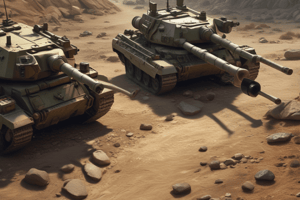Podcast
Questions and Answers
What is the primary purpose of military planning?
What is the primary purpose of military planning?
- To implement military operations without any planning
- To create diplomatic relations
- To develop strategies and tactics (correct)
- To analyze historical data
Why is strategy considered a crucial aspect of military planning?
Why is strategy considered a crucial aspect of military planning?
- To ignore geopolitical context
- To increase costs and risks
- To downplay strengths and capabilities
- To secure advantage over adversaries (correct)
What factors need to be carefully considered in the development of military strategies?
What factors need to be carefully considered in the development of military strategies?
- Technological advancements (correct)
- Musical preferences
- Culinary preferences
- Fashion trends
Why are international alliances and potential threats important considerations in military planning?
Why are international alliances and potential threats important considerations in military planning?
How do effective strategies help improve a nation's chances of success in conflicts?
How do effective strategies help improve a nation's chances of success in conflicts?
In military planning, what is the significance of understanding the broader strategic environment?
In military planning, what is the significance of understanding the broader strategic environment?
What is essential for developing effective military strategies?
What is essential for developing effective military strategies?
What is a key aspect of military planning that involves preparedness for negative consequences?
What is a key aspect of military planning that involves preparedness for negative consequences?
Why is innovation crucial in modern military planning?
Why is innovation crucial in modern military planning?
What characterizes today's military strategies?
What characterizes today's military strategies?
How do successful military planners allocate resources?
How do successful military planners allocate resources?
What does developing robust strategies in military planning help safeguard?
What does developing robust strategies in military planning help safeguard?
Study Notes
Military planning refers to the process of developing strategies, tactics, and operations to achieve specific military objectives. It involves analyzing potential threats, identifying strengths and weaknesses, and determining the best course of action to protect national security interests and effectively respond to conflicts. One of the crucial aspects of military planning is strategy, which involves the development and implementation of plans designed to secure advantage over adversaries while minimizing risks and costs.
Strategy plays a vital role in military planning because it helps to capitalize on the strengths and capabilities of a nation's armed forces, while simultaneously neutralizing the opponent's advantages. It requires careful consideration of various factors, including geopolitical context, technological advancements, diplomatic relations, and economic conditions. By developing and refining effective strategies, militaries can improve their chances of success in any given conflict scenario.
To understand the importance of strategy in military planning, consider the following aspects:
-
Context: The broader strategic environment in which military planning takes place is crucial. This includes understanding regional dynamics, international alliances, and potential threats to global stability. Strategists must carefully analyze these factors to develop contingencies and adapt their plans accordingly.
-
Capabilities: Identifying the strengths and limitations of one's own forces, as well as those of potential adversaries, is essential for developing effective strategies. This analysis allows military planners to allocate resources efficiently and tailor plans to maximize their impact in light of resource constraints.
-
Objectives: Clearly defining the desired outcomes of military actions is necessary for successful planning. Strategies should be aligned with overall national goals and priorities, ensuring that military efforts contribute meaningfully to achieving these objectives.
-
Consequence Management: Establishing a robust consequence management framework is essential in military planning. This involves being prepared for possible negative consequences that may arise from military interventions, such as humanitarian crises or environmental disasters, and developing plans to mitigate these risks effectively.
-
Innovation: In a rapidly changing world, the ability of militaries to adapt and innovate is crucial for maintaining strategic advantage. Strategy in military planning must embrace new technologies, operational concepts, and organizational models to remain effective in an evolving threat environment.
Military strategy has evolved over time, reflecting changes in geopolitical dynamics, technological advancements, and shifts in military doctrine. Today's strategies are characterized by increased focus on precision strike capabilities, joint operations across multiple domains (land, sea, air, space, cyberspace), and an emphasis on strategic communication and information warfare. These developments underscore the importance of adaptability, innovation, and robustness in modern military planning.
In conclusion, strategy plays a vital role in military planning. It allows nations to capitalize on their strengths while minimizing weaknesses, align objectives with national goals, and respond effectively to various threats. By focusing on key aspects such as context, capabilities, objectives, consequence management, and innovation, military planners can develop robust strategies that safeguard national security interests and ensure successful execution of military operations when needed.
Studying That Suits You
Use AI to generate personalized quizzes and flashcards to suit your learning preferences.
Description
Test your knowledge on the crucial role of strategy in military planning, including aspects like understanding context, assessing capabilities, defining objectives, managing consequences, and promoting innovation. Explore the significance of strategy in developing effective military plans to achieve national security interests.



